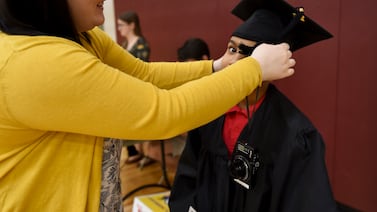Sign up for Chalkbeat Newark’s free newsletter to keep up with the city’s public school system.
Newark organizations are launching an initiative aimed at improving student reading rates and early learning outcomes by supporting educators in tackling the city’s “urgent” literacy crisis.
My Brothers Keeper Newark, in partnership with Rutgers University Newark, is hosting the Newark Early Literacy Professional Learning Community, which will focus on strengthening educators' understanding of foundational literacy skills and practices in the classroom.
The goal is about not only acquiring new skills, but also fostering a community of educators who are equipped to navigate the literacy challenges students are facing since the pandemic, according to Jhanae Wingfield, who is working with My Brothers Keeper to launch the professional learning community.
The project will span nine sessions starting in November and cover pre-K to third-grade literacy topics such as phonics, writing fluency, comprehension, and cultural response literacy learning, among others. The sessions will also review recently signed literacy legislation taking effect next school year to prepare educators to meet the needs of young students and ensure all children can read at or above grade level.
“The need is already here, and we really wanted to think about how we can establish, or start to build out a literacy ecosystem,” said Wingfield, assistant professor of professional practice at Rutgers University Newark. “How are we creating full systems that address this literacy concern from different angles, but also create more sustainable pathways to keep the success and growth going?”
Professional learning communities, a widely used strategy in education, bring together administrators, teachers, literacy coaches, and community partners to discuss school development and student achievement. Last summer, Newark Mayor Ras Baraka declared an “urgent” literacy crisis throughout the city and launched a 10-point Youth Literacy Action Plan that calls on schools, programs, and city leaders to help students refine foundational reading and writing skills.
This school year, Newark Public Schools’ proficiency rates on spring statewide assessments rose by roughly 2 percentage points in English language arts but remained behind pre-pandemic levels, pointing to students’ slow post-COVID academic recovery. English language arts performance among the city’s public school third-graders remains the lowest of any grade for a third year in a row, but higher than last year’s proficiency rate – now at 23.4%.
Newark has many assets, said Mark Comesañas, who is leading the new initiative as the executive director of My Brothers Keeper Newark. His organization is focused on “better coordinating all of those assets” by leveraging the community resources already available for students.
He said he believes that city students have been among the hardest hit by remote learning, and that illiteracy is an “urgent crisis” Newark leaders should remain committed to ending.
“There’s a long way for everyone to go in moving literacy outcomes, and we hope that this is one way to help us do that together,” Comesañas added.
The work of the learning community will be “foundational, but rigorous,” Wingfield said. Educators will be challenged to reflect on their literacy practices and ask themselves how they can make adjustments in their classrooms to support student’s understanding of basic reading and writing skills such as learning to spell, improving their handwriting, and refining their vocabulary. The sessions will also cover best practices to support English language learners and students with disabilities, who remain the furthest from academic recovery since the pandemic. And the learning community will focus on preparing parents through a parent academy by explaining high-level literacy topics and equipping them with the skills needed to engage their children with reading and writing at home.
Experts from My Brothers Keeper Newark will facilitate the sessions in combination with literacy leaders from Rutgers University Newark and professionals like Mary Ann Reilly, former Newark Public Schools’ assistant superintendent of teaching and learning, who has more than 40 years’ of experience in public and charter districts.
The group will also review new state legislation aimed at improving student reading proficiency by mandating literacy screenings for K-3 students, using high-quality literacy instructional materials, and implementing data analysis strategies for literacy instruction and intervention. The legislation, signed by Gov. Phil Murphy in August, takes effect next school year and is intended to require an early intervention program and establish a new office in the state’s education department dedicated to equity and academic recovery, all of which hold special significance in Newark where youth literacy rates are struggling.
The professional learning community will hold its first session on Nov. 19 and is currently recruiting participants. Those interested can register online or email info@mbknewark.org for more details.
Jessie Gómez is a reporter for Chalkbeat Newark, covering public education in the city. Contact Jessie at jgomez@chalkbeat.org.





